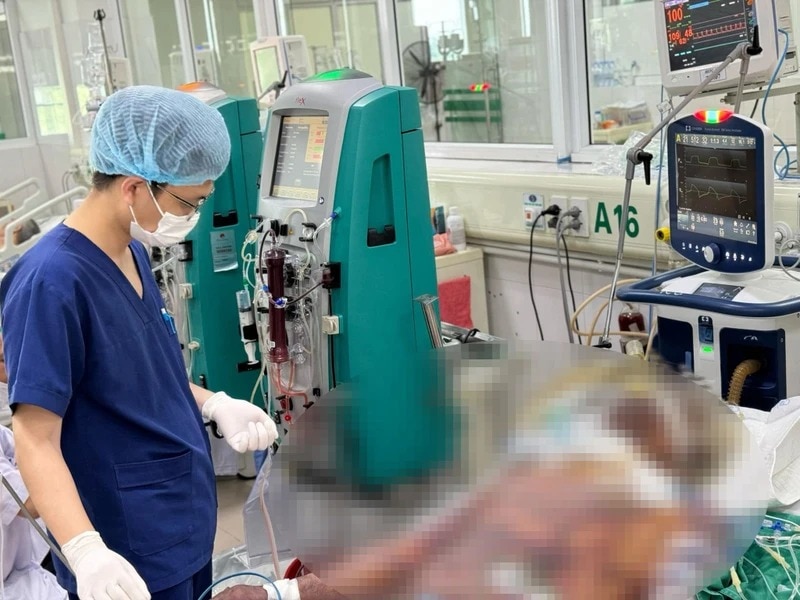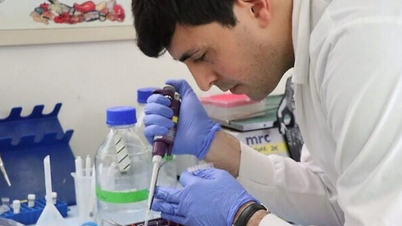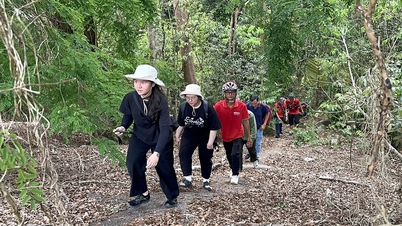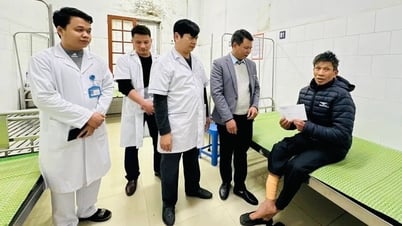Medical news August 6: Hanoi has its first death due to streptococcus
According to the Hanoi Department of Health, the first death from streptococcus this year was an 86-year-old female patient in Quoc Oai district.
Death due to streptococcus
Her family took her to Military Hospital 103 with symptoms of high fever, headache, drowsiness, etc. Here, the patient was admitted for inpatient treatment and had blood and cerebrospinal fluid cultures tested.
 |
| Experts recommend that people absolutely do not use unprocessed pork. |
The patient tested positive for Streptococcus suis. Despite intensive treatment, due to old age and severe disease progression, the patient did not survive.
This is the city’s first death from swine streptococcus infection this year. So far this year, Hanoi has recorded 7 cases of swine streptococcus infection, including one death.
According to health experts, people at high risk of contracting streptococcus are those who participate in slaughtering pigs, processing sick or dead pigs; people who work in concentrated pig slaughterhouses; people who eat raw blood pudding and pork products that are not thoroughly processed.
With this disease, the incubation period is short, from a few hours to 2-3 days, however, in some cases the incubation period can be up to several weeks.
People infected with Streptococcus suis may develop sepsis, purulent meningitis, or a combination of both. Depending on the type, the disease can progress to a mild or severe stage, with some cases being severely infected from the start.
The most common clinical picture of streptococcal infection is meningitis. The common symptoms of meningitis are as follows: high fever, headache, nausea, vomiting, tinnitus, deafness, stiff neck, impaired perception, subcutaneous hemorrhage in the form of spots and patches on the ear rim, nose, face, trunk... Examination shows stiff neck, lumbar puncture shows abnormalities: cloudy fluid, increased pressure, increased white blood cells and protein in the cerebrospinal fluid...
Severe cases progress rapidly to sepsis syndrome, septic shock (with or without meningitis): circulatory collapse, severe blood clotting disorders, multiple organ failure, gastrointestinal bleeding, coma, and rapid death.
Many children have Covid-19, parents mistake it for flu
According to Dr. Nguyen Huu Vinh, Head of the General Planning Department of Hai Duong Children's Hospital, in the past month, the number of children with Covid-19 who had to be hospitalized for treatment has been the highest since the beginning of the year. The hospital's Infectious Diseases Department regularly has 10-15 children with Covid-19 receiving inpatient treatment.
All children under 1 year old, who have not been vaccinated against Covid-19, were hospitalized with a high fever of 38-39 degrees Celsius or higher, runny nose, cough, fussiness, and loss of appetite.
Before being admitted to the hospital, most of the children had been given medicine by their parents at home but it did not help. They mistakenly thought their children had influenza A, influenza B, etc. It was only when they were admitted to the hospital for testing that they were confirmed to have Covid-19.
Hai Duong Children’s Hospital has an isolation area to treat Covid-19 patients. Most children with the disease are discharged after a few days of treatment. Since the beginning of the year, Hai Duong Children’s Hospital has not recorded any Covid-19 patients with serious complications.
However, Dr. Nguyen Huu Vinh warns that parents who arbitrarily buy medicine to treat their children at home without knowing exactly what disease their children have can cause serious harm to their health.
Children with Covid-19 who are treated at home incorrectly or for a long time may have dangerous complications related to the respiratory system. When children show unusual health symptoms, parents should take them to see a doctor for timely examination and treatment advice.
Parents should not let their children come into contact with adults showing signs of illness, limit going to crowded places, and ensure children have balanced daily meals to increase their resistance...
A big step forward in Genetics
Speaking at a recent event of the Vietnam Genetics Association, Associate Professor, Dr. Kim Bao Giang, Vice Rector of Hanoi Medical University, said that the field of medical genetics is increasingly contributing to medicine. Biomedical-genetic activities are gradually contributing to disease diagnosis, disease prevention and treatment of genetic diseases.
In recent years, the field of genetics has made many new strides with the development of genetic techniques, creating many great changes in many fields.
Especially in medicine, the application of genetic achievements has brought many breakthroughs in disease diagnosis and treatment, contributing to better health care for Vietnamese people. Medical genetics affects all medical fields such as: oncology, hematology, cardiology, and reproductive support.
According to the President of the Vietnam Medical Genetics Association, Associate Professor, Dr. Tran Duc Phan, advances in genetic engineering have created great strides in the treatment of important diseases such as cancer. These include targeted therapy, immunomodulation therapy and gene therapy.
Genetic interventions are increasingly being applied, including in the treatment of difficult diseases such as cancer.
Some of the current advances in cancer genetics are oligonucleotide gene therapy; Oncolytic virus therapy; Cell and tissue therapy; Cancer vaccines and genetic interventions in cancer, especially methods using CRISPR-Cas9.
Genetic interventions are taking shape and will be a future direction. Gene therapy and targeted molecular therapy provide previously unimaginable clinical and therapeutic outcomes for cancer.


![[Photo] Hanoi morning of October 1: Prolonged flooding, people wade to work](https://vphoto.vietnam.vn/thumb/1200x675/vietnam/resource/IMAGE/2025/10/1/189be28938e3493fa26b2938efa2059e)



![[Photo] President of the Cuban National Assembly visits President Ho Chi Minh's Mausoleum](https://vphoto.vietnam.vn/thumb/1200x675/vietnam/resource/IMAGE/2025/10/1/39f1142310fc4dae9e3de4fcc9ac2ed0)
![[Photo] Keep your warehouse safe in all situations](https://vphoto.vietnam.vn/thumb/1200x675/vietnam/resource/IMAGE/2025/10/1/3eb4eceafe68497989865e7faa4e4d0e)

























































































Comment (0)